Related Research Articles
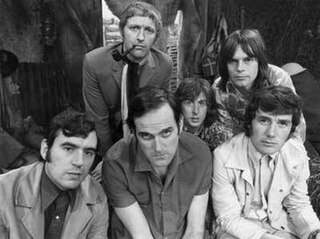
Monty Python were a British comedy troupe formed in 1969 consisting of Graham Chapman, John Cleese, Terry Gilliam, Eric Idle, Terry Jones, and Michael Palin. The group came to prominence for the sketch comedy series Monty Python's Flying Circus, which aired on the BBC from 1969 to 1974. Their work then developed into a larger collection that included live shows, films, albums, books, and musicals; their influence on comedy has been compared to the Beatles' influence on music. Their sketch show has been called "an important moment in the evolution of television comedy".

The "Dead Parrot Sketch", alternatively and originally known as the "Pet Shop Sketch" or "Parrot Sketch", is a sketch from Monty Python's Flying Circus about a non-existent species of parrot, called a "Norwegian Blue". A satire on poor customer service, it was written by John Cleese and Graham Chapman and initially performed in the show's first series, in the eighth episode.
The "Cheese Shop" is a sketch from Monty Python's Flying Circus.
"The Funniest Joke in the World" is a Monty Python comedy sketch revolving around a joke that is so funny that anyone who reads or hears it promptly dies from laughter. Ernest Scribbler, a British "manufacturer of jokes", writes the joke on a piece of paper only to die laughing. His mother also immediately dies laughing after reading it, as do the first constables on the scene. Eventually the joke is contained, weaponized, and deployed against Germany during World War II.

Sir Michael Edward Palin is an English actor, comedian, writer, and television presenter. He was a member of the Monty Python comedy group. He received the BAFTA Fellowship in 2013 and was knighted by Queen Elizabeth II in 2019.

"The Lumberjack Song" is a comedy song by the comedy troupe Monty Python. The song was written and composed by Terry Jones, Michael Palin, and Fred Tomlinson.
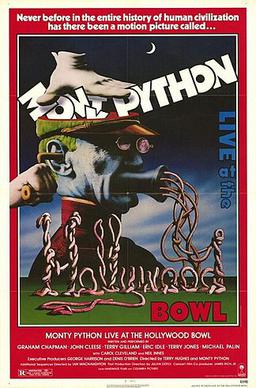
Monty Python Live at the Hollywood Bowl is a 1982 concert comedy film directed by Terry Hughes and starring the Monty Python comedy troupe as they perform many of their sketches at the Hollywood Bowl. The film also features Carol Cleveland in numerous supporting roles and Neil Innes performing songs. Also present for the shows and participating as an 'extra' was Python superfan Kim "Howard" Johnson.
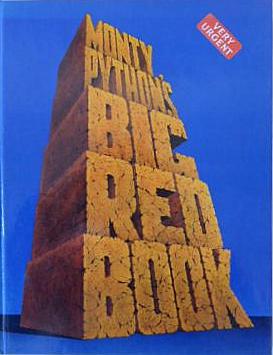
Monty Python's Big Red Book is a humour book comprising mostly material derived and reworked from the first two series of the Monty Python's Flying Circus BBC television series. Edited by Eric Idle, it was first published in the UK in 1971 by Methuen Publishing Ltd. It was later published in the United States in 1975 by Warner Books.

And Now for Something Completely Different is a 1971 British sketch comedy film based on the television comedy series Monty Python's Flying Circus featuring sketches from the show's first two series. The title was taken from a catchphrase used in the television show.
The Dirty Fork, also known simply as Restaurant Sketch, is a Monty Python sketch that appeared in episode 3 of the first series of the television series Monty Python's Flying Circus, and later in the film, And Now For Something Completely Different. It is notable for being the first Monty Python sketch wherein the characters react to the audience "booing" them.

Monty Python's Fliegender Zirkus are a pair of 45-minute Monty Python German television comedy specials produced by WDR for West German television. The two episodes were respectively first broadcast in January and December 1972 and were shot entirely on film and mostly on location in Bavaria, with the first episode recorded in German and the second recorded in English and then dubbed into German.
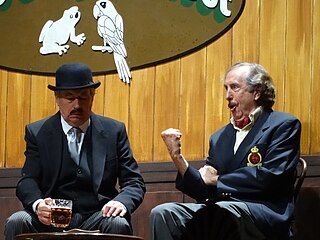
"Candid Photography", better known as "Nudge Nudge", is a sketch from the third Monty Python's Flying Circus episode, "How to Recognise Different Types of Trees From Quite a Long Way Away" featuring Eric Idle and Terry Jones as two strangers who meet in a pub.

Monty Python's Personal Best is a miniseries of six one-hour specials, each showcasing the contributions of a particular Monty Python member. Produced by Python (Monty) Pictures Ltd., the series first aired on PBS stations between 22 February and 8 March 2006, although the Eric Idle and Michael Palin episodes were initially released by A&E on two Region 1 DVDs in 2005; the remaining episodes were released in late February 2006.

Parrot Sketch Not Included – 20 Years of Monty Python is a British television special dedicated to Monty Python, created to commemorate the 20th anniversary of the debut of the comedy group's television series, Monty Python's Flying Circus. Produced by Tiger Aspect Productions for the BBC, it was compiled by renowned British comedy producer John Lloyd and aired on BBC 1 on 18 November 1989.
The Marriage Guidance Counsellor sketch is from the second Monty Python's Flying Circus episode, "Sex and Violence", first broadcast late on Sunday, 12 October 1969. Written by Eric Idle, it was also featured in the 1971 spinoff film And Now for Something Completely Different.

Python Night was an evening of Monty Python-related programmes broadcast on BBC2 on 9 October 1999, to celebrate the 30th anniversary of the first broadcast of Monty Python's Flying Circus. It featured newly written sketches, three documentaries and a screening of Monty Python's Life of Brian.

Not the Messiah (He's a Very Naughty Boy) is a comedic oratorio based on Monty Python's Life of Brian. It was written by former Monty Python cast member Eric Idle and collaborator John Du Prez, and commissioned by the Luminato festival.
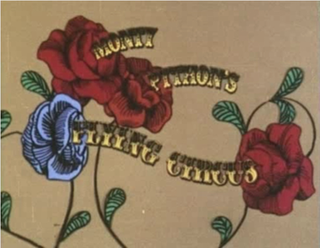
Monty Python's Flying Circus is a British surreal sketch comedy series created by and starring Graham Chapman, John Cleese, Eric Idle, Terry Jones, Michael Palin, and Terry Gilliam, who became known collectively as "Monty Python", or the "Pythons". The first episode was recorded at the BBC on 7 September 1969 and premiered on 5 October on BBC1, with 45 episodes airing over four series from 1969 to 1974, plus two episodes for German TV. A feature film adaptation of several sketches, And Now for Something Completely Different, was released in 1971.

The Fairly Incomplete & Rather Badly Illustrated Monty Python Song Book is a compendium of songs by Monty Python, released in 1994 on the occasion of their 25th anniversary. The book contains the lyrics and musical scores for songs from the group's Flying Circus TV series, albums and films. Also included are "The Ferret Song" and "Rhubarb Tart Song", which originate from I'm Sorry, I'll Read That Again before appearing on At Last The 1948 Show. The musical scores were edited by regular Python collaborator, John Du Prez.
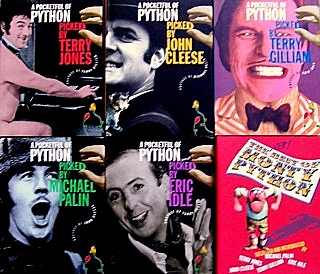
A Pocketful of Python is a series of five books by the Monty Python team, in which each of the surviving members selects their favourite material from the group’s TV series, films, records and books. The first two volumes, by Terry Jones and John Cleese, were released in 1999 as part of the team’s 30th anniversary celebrations. Two further volumes, by Terry Gilliam and Michael Palin, followed in 2000 while the final volume, by Eric Idle, was eventually released in 2002. Each team member’s volume includes a preface written by one of the other Pythons. In 2006 all five volumes were released as a single paperback edition, entitled The Very Best of Monty Python.
References
- 1 2 "Vocational Guidance counselor, As featured in the Flying Circus TV Show - Episode 10". Orangecow. Retrieved 23 March 2009.
- ↑ Perry, George (1983). Life of Python. Original from the University of Michigan, Digitized May 21, 2008 (illustrated ed.). Pavilion. p. 192. ISBN 0-907516-22-X.
- ↑ Smith, Malcolm; Susan Briggs (1999). "From Bean-counter to Action Hero: Changing the Image of the Accountant". Management Accounting (UK). 77 (1): 28–30. reprinted in Smith, Malcolm (2003). Research methods in accounting. SAGE. p. 202. ISBN 978-0-7619-7147-4 . Retrieved 27 March 2009.
- ↑ Learn the elementary bits about business, Financial Times, 14 October 2008
- ↑ Alan Parker, Mick O'Shea (2006). And Now for Something Completely Digital. pp. 44–45. ISBN 978-1-932857-31-3.
- ↑ "Vocational Guidance Counsellor". shooting script. Jump Station. Retrieved 23 March 2009.
- ↑ "Monty Python's Flying Circus: Set One—Volume 1". Digitally Obsessed. Retrieved 23 March 2009.
- ↑ "Monty Python's Flying Circus: Graham Chapman's Personal Best". review. IGN. 12 April 2006. Archived from the original on 9 July 2012. Retrieved 23 March 2009.